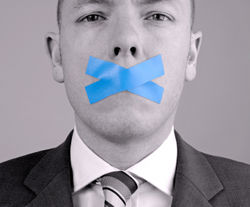 Most of the people I work with are lovely. But every freelance web copywriter has encountered a tricky client or two – and I’m no exception.
Most of the people I work with are lovely. But every freelance web copywriter has encountered a tricky client or two – and I’m no exception.
Sure, sometimes, it’s these tricky clients that are most enjoyable to work with. Getting to grips with a complex product or working through a complicated brief can be highly satisfying.
But there are some things us web copywriters don’t like hearing from clients. They set the alarm bells ringing. Here’s why…
1. “Will you do this copywriting job for free?”
Usually, this question is followed by a promise that “if things go well”, there’ll be “lots of paid work to come.” Invariably, this is untrue.
The work that us web copywriters do brings significant benefits to our clients. As a result, we expect to be paid a fair fee. (There may be the odd time when you’ll get some free web copywriting. But don’t hold your breath.)
2. “It’s perfect. I just have to get sign-off from my manager. And the product manager. And the MD.”
Editing is an important part of the copywriting process. Often, constructive feedback and the subsequent changes are what transform a good piece of work into a great piece of work.
But that’s only possible when feedback is clear and unambiguous. If several people need to be involved in the approval and sign-off process, it’s best for them all to review draft content at the same time. Often, different people have very different views on what needs changing, so feedback needs to be consolidated and agreed.
Any copywriter worth their salt will help you with this. For instance, a conference call with key people followed by a quick email confirming the scope of changes can work wonders.
3. “Can we get those amendments back today?”
Usually, this request comes after a client has taken several weeks or months to send their own feedback to the writer.
It’s not that we don’t want to deliver, you understand. But in the same way that many clients are too busy to be able to review draft content immediately, good web copywriters won’t always be able to drop everything to hit a short-notice deadline.
(Depending on the project, I try to agree a clear schedule which includes dates for delivery of draft content, feedback and edits.)
4. “I’d write it myself, except I don’t have the time.”
I’m a professional writer, skilled at crafting content for the web that delivers tangible benefits to my clients.
I can help increase your sales, create a distinctive image for your business and talk to your customers in their language. And I want to work with clients who recognise me for those skills.
5. “No, I’m afraid we don’t sign contracts.”
I have been incredibly lucky with the clients I’ve worked with. Almost without exception, they pay up reliably and on time. Having heard many horror stories, I’m very grateful for this.
But I still get nervous when new clients aren’t willing to sign a copywriting contract or commit to anything more than a verbal agreement. A clear, simple contract protects both parties, and is one of the key foundations of a good working relationship.
 An experience this week has reminded me of one of the internet’s truisms: once you’ve put something online, you can’t control how it gets used.
An experience this week has reminded me of one of the internet’s truisms: once you’ve put something online, you can’t control how it gets used.
Along with a few hundred other people, I went down to the BBC’s Broadcasting House last weekend to protest against the closure of BBC 6 Music.
While I was there, I snapped a bunch of photos and put them up on Flickr.
They’re not great shots, but nonetheless the Love 6 Music website wanted to use them. Fair enough, I thought. After all, I support what they’re trying to achieve. Some of my pictures duly appeared on the site.
The next day The Guardian covered the protest – and included some of my photos in a gallery, all credited to www.love6music.com. It turns out the people behind the campaign had spoken to The Guardian and allowed them to use the pictures.
Now, initially I was taken aback by this. I felt I’d given permission for the photos to be used on a non-profit campaigning website, not on a commercial newspaper’s site.
However, once I thought it through, I realised I’d been pretty vague – I’d given permission in an easily-misinterpreted tweet which didn’t really explain under what circumstances I’d be unhappy with the photos being used:
“Sure, be my guest [to use the photos]! They’re all Creative Commons anyway.”
I allow most of my photos on Flickr to be used for non-commercial purposes under a system called Creative Commons. However, I’ve never wanted commercial websites to use my pictures for free. It’s the same for my writing; if someone’s making money from my work in some way, I expect to get paid.
Anyway, in this case I decided to bend my principles a bit. It is pretty cool to have your pictures on a national newspaper’s website, and I care a lot about the survival of this particular radio station, so I emailed The Guardian and asked for a credit, which they duly added.
So, all’s well that ends well? Yes, in this case. But it goes to show just how hard it is to keep tabs on your digital content.
It doesn’t matter if it’s words, pictures, video or sound – someone can always grab it and use it the way they want. And even though technically you keep the copyright and can forbid people from using it, in practice it’s hard to even find out it’s happened.
That’s a pain where your professional work is concerned. But when it’s personal photos, musings or other stuff you absolutely have to keep control of, you’re better off not putting it online in the first place. That’s the only way to be 100% certain it’s not being used in ways that make you unhappy.
The specific lesson I learnt in this case is that when someone is nice enough to ask permission before taking your content, always make your answer specific. If you’re not happy for them to pass your stuff on for publication on other websites, tell them. Because if you don’t, you can’t really complain when your content starts popping up in unexpected places.
 No matter whether you’re a professional web copywriter (like me) or a professional something-else (maybe that’s you), we all have to edit our own work from time-to-time.
No matter whether you’re a professional web copywriter (like me) or a professional something-else (maybe that’s you), we all have to edit our own work from time-to-time.
We do it when we read through an email before sending it, when we put the finishing touches to a new business proposal or when we dash off a press release. (You probably don’t do it when writing the weekly shopping list, but that’s ok.)
Editing isn’t easy
It’s not easy to edit your own text. Because you wrote it, you’re less likely to spot mistakes. Trust me – I once wrote a blog post promoting an event which got a the date of the event totally wrong. I wrote “14 November” instead of “14 January”. And I didn’t realise until a reader pointed it out.
That happened because I was in a rush. I wanted to get the information out there as soon as possible. Want to avoid this sort of embarrassing mistake? I’ve put together a few tips for you:
(more…)
 Most of the people I work with are lovely. But every freelance web copywriter has encountered a tricky client or two – and I’m no exception.
Most of the people I work with are lovely. But every freelance web copywriter has encountered a tricky client or two – and I’m no exception.
 An experience this week has reminded me of one of the internet’s truisms: once you’ve put something online, you can’t control how it gets used.
An experience this week has reminded me of one of the internet’s truisms: once you’ve put something online, you can’t control how it gets used. No matter whether you’re a professional web copywriter (like me) or a professional something-else (maybe that’s you), we all have to edit our own work from time-to-time.
No matter whether you’re a professional web copywriter (like me) or a professional something-else (maybe that’s you), we all have to edit our own work from time-to-time.